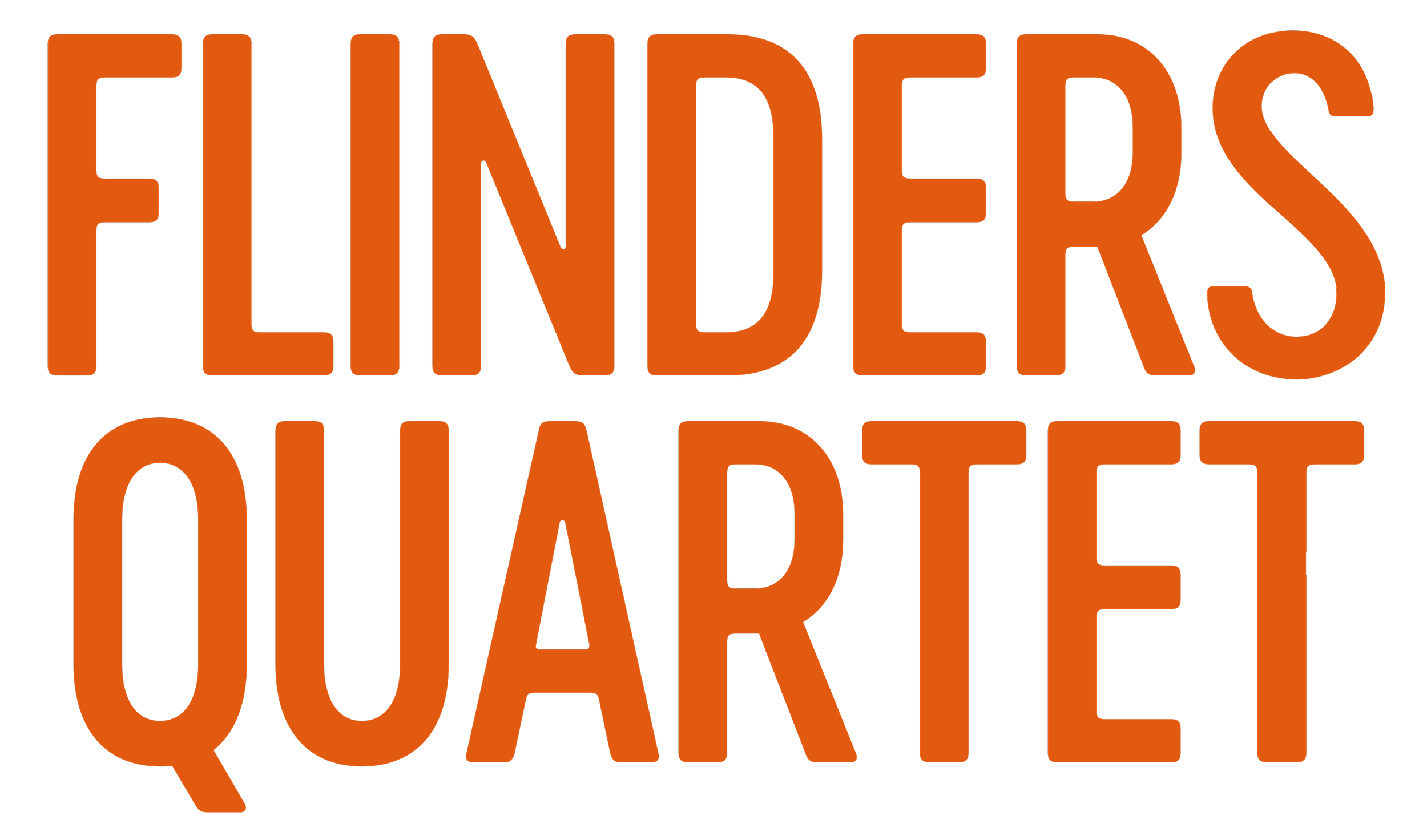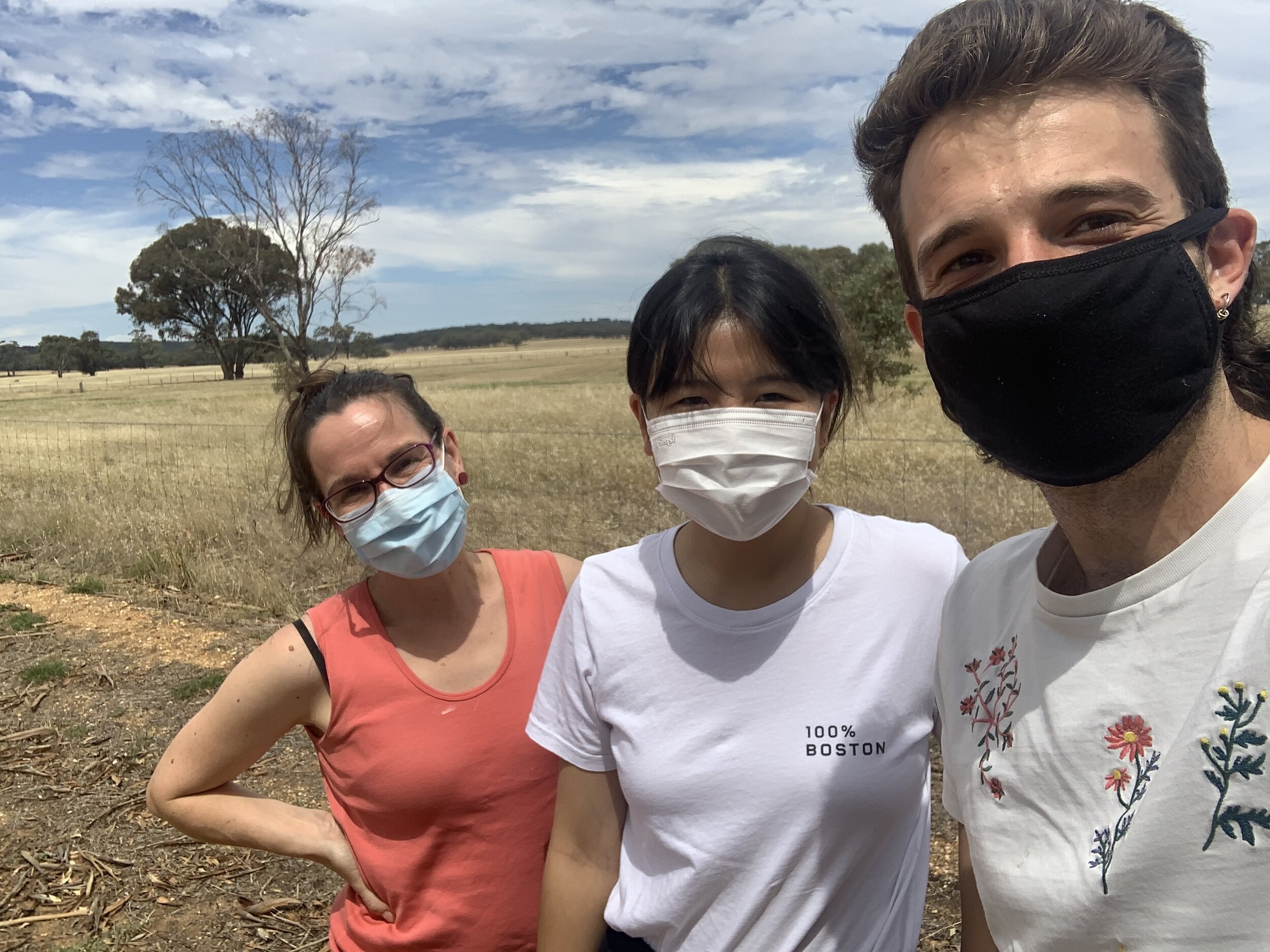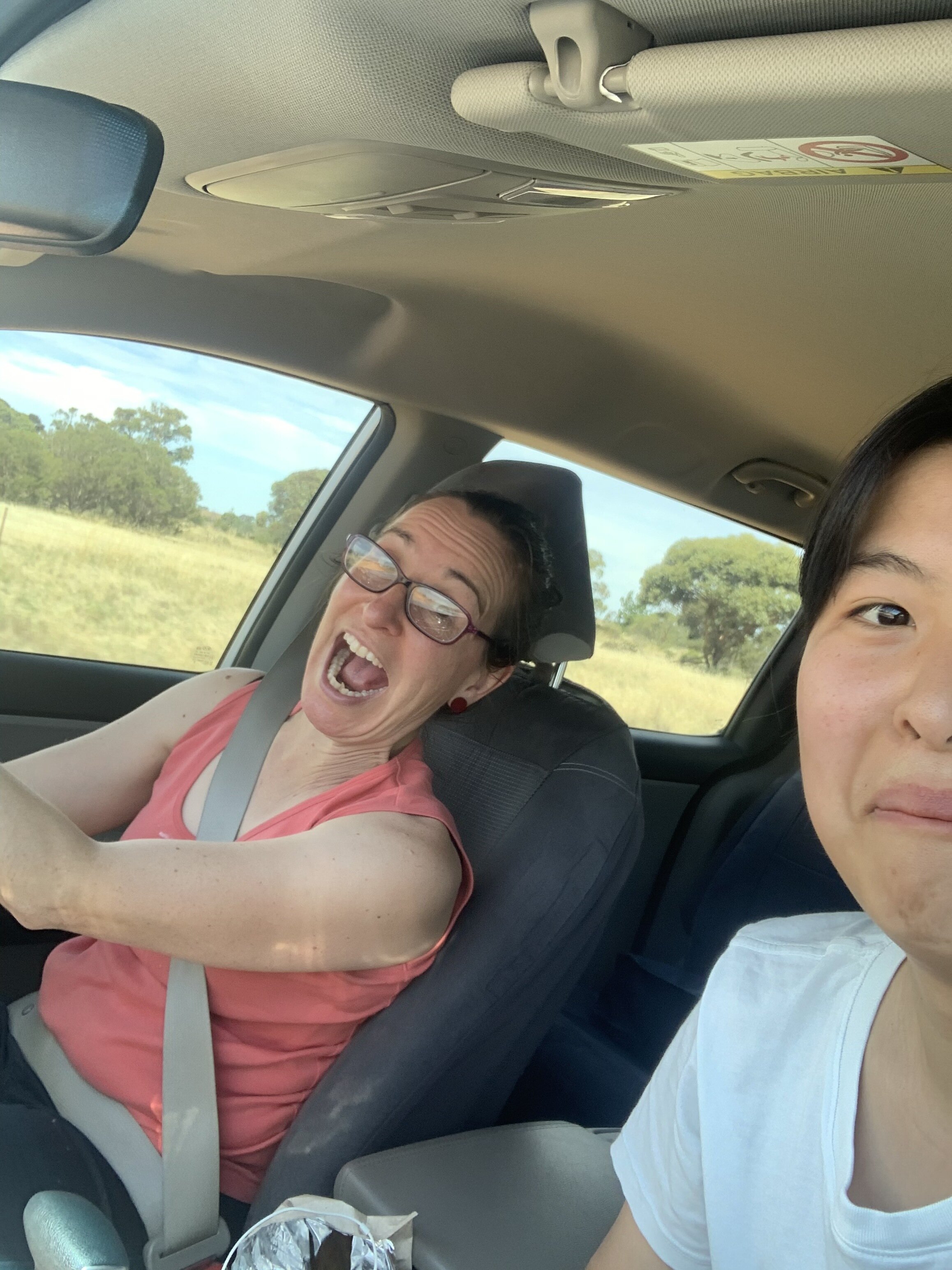FIFTH STRING MEMBERS BLOG: FQ at 2021 Adelaide Festival
I’m sure that most festivals, promoters and events have plan A, B and C, in fact, probably an entire alphabet of plans to cope with COVID lockdowns and the myriad of possible scenarios. But no one ever wants to have to implement them.
Our invitation to the Adelaide Festival came during the big Melbourne lockdown of 2020 and was such a ray of sunshine to look forward to in an ocean of cancellations. Kim Williams AM curated “Incredible Floridas: Chamber Landscapes” for the festival, one of the most fascinating and enriching programs I have ever seen and we were thrilled with the prospect of making our UKARIA debut with some magnificent repertoire. A masterclass in the history of Australian classical music and poetry, every single concert had multiple gems, all centred around Richard Meale’s seldom performed masterpiece “Incredible Floridas”. In fact, the majority of the music was seldom performed, but that’s another story.
At FQ, we do have a reputation as being eternal optimists but even we could see that a lockdown was imminent when Melbourne recorded a number of new cases mid February. It hit close to home when the Music by the Springs chamber music festival in Hepburn Springs was cancelled, so when we received the call from Adelaide Festival asking us to go over early to quarantine and ensure we could perform, it was an unequivocal yes. What began as a planned Thursday departure potentially by plane and self isolation in a house, quickly turned into driving the next day (a Tuesday), individual hotel quarantine, and then self isolation in a house near UKARIA in a ‘quartet bubble’ (after we had returned multiple negative COVID tests). In our minds, we were almost signing up to a musical ‘Big Brother’ scenario, and it sounded like fun.
A quartet is never just four people. Partners, parents and children are an important part of most decisions made. With an 18 month old baby (the gorgeous Ediz) and the necessity of hotel quarantine, Helen made the very difficult decision not to take part in the festival. After many hours of practise, in depth chats about the music and the promise of road trips, group cooking, and a UKARIA debut, this was an immense sacrifice. So began an intense 24 hours to find a new violist. Miraculously, Wenhong Luo, the newly appointed Lecturer in viola at the Melbourne Conservatorium of Music was given permission to take part and then we had to quickly bring her up to speed about our repertoire.
As all of our arrangements (understandably) kept changing, I was updating Wenhong:
Z: “Wenhong, we’re no longer leaving on Thursday, we are leaving tomorrow, on Tuesday.”
W: “No problem…”
Z: “Wenhong, we are no longer flying, we are driving to Adelaide.”
W: “No problem”...
Z: “Wenhong, we are no longer in self isolation in a house, we have to stay on our own, in hotel quarantine for 6 days, unable to rehearse.”
W: “No problem”...
Z: “Wenhong, there is quite a lot of music, I do hope it’s not going to be overwhelming.”
W: “No problem”...
We knew she was going to be the perfect replacement for this scenario.
I started sending through the list of repertoire whilst I was on the phone to Wenhong:
Margaret Sutherland String Quartet No. 1
Margaret Sutherland String Quartet No. 3
Alfred Hill String Quartet No. 17
Then the collaborations:
Ross Edwards Bright Birds with Michael Duke saxophone
Peter Sculthorpe Song for Neilma with Geoff Collins flute
Elena Kats-Chernin The Offering with Jacob Abela piano
Margaret Sutherland The World and Child with Jessica Azsodi voice
The the string orchestra music to be played with the Australian String Quartet:
Margaret Sutherland Concerto for Strings
Peter Sculthorpe Sonata for Strings
Peter Sculthorpe Irkanda IV
Elena Kats-Chernin Wild Swans Suite
It was at this point in the conversation that Wenhong’s voice went very quiet and she said “Is there much more?”
Just the Peggy Glanville Hicks viola concerto and Percy Grainger’s Handel in the Strand and Harvest.
Suitably overwhelmed but more than up for the challenge, Wenhong agreed to be picked up and driven to Adelaide. Wenhong’s experience of Australia thus far had been confined to various versions of Melbourne lockdown’s since February 2020, which had left little time for exploration. As a Chinese national, educated in London and Boston, this road trip and repertoire were going to be the most marvellous introduction to Australian classical culture.
It has to be said that the administration and management of the festival looked after us at every step of the way and we felt like we were in the very best of hands. Each of us answering calls from SA police determining our eligibility to cross the border and strict instructions on our quarantine, we felt like we were on an international diplomatic mission rather than a dash to play some really great chamber music.
At this time, everyone was a little apprehensive about the future and the prospect of quarantine. Musicians rarely feel like frontline workers, but being some of the only people on the road during lockdown gave us a bizarre feeling of importance. That honestly doesn’t happen very often. In addition to Wenhong, I picked up the brilliant young pianist, Jacob Abela, who was to join us in Elena Kats-Chernin’s “The Offering”. Jacob confessed later that he was feeling incredibly anxious until he got in the hire car with us and we already had the soundtrack to “Cabaret” playing. He said he knew right there and then that everything was going to be okay and once again, music was instrumental in helping make sense of a situation.
One of the highlights of the drive was listening to Sculthorpe’s Sonata for Strings while driving through a wind farm. The excited chatter was quickly silent and we all felt a little like we were living out a movie set and soundtrack.
Every artist involved in the festival was grateful to have the excuse of immersing themselves in the repertoire, because the simple fact is that most marvellous music is really quite tricky to perform. It requires months of preparation before rehearsals begin. The risk with programming unknown music is that people won’t buy tickets, so Kim and the festival must have been doing something astoundingly right as the “Incredible Floridas” part of the festival was sold out before the end of 2020. Not only were we preparing phenomenal music that we wouldn’t ordinarily program, but it would be performed to a full house. Admittedly, we had already decided that Margaret Sutherland was someone we wanted to champion and had already confirmed our own FQ Sutherland Festival in Melbourne (also sold out!) and to record a complete cycle of her works for string quartet for ABC. Indeed, many people said that Margaret Sutherland and her strong, individual sound was the standout of the festival.
Up until this point, we had been practising all of the music on our own (Wilma, Thibaud and myself for a number of months and Wenhong for a number of hours) and the necessity of Melbourne’s lockdown and then quarantine meant that we lost more than a week of rehearsals. Channeling FQ’s spirit of optimism, I decided that a good use of time would be to source the original manuscript of the Margaret Sutherland works we were performing to double check that we were playing as close to possible what she originally intended. Reading computer music is far easier than a composer’s artistic scrawl but in viewing the original copies (scanned and sent so generously by the Australian Music Centre) it was like receiving a handwritten letter from Margaret. The crossing out, the notes in pencil obviously from performers making their own notes and the visible compositional decision making. What we hadn’t expected was the amount of time it took to go through each bar of each part in detail to ensure we were obeying Margaret’s voice and it felt incredibly satisfying to know that we were making our decisions from seeing her work first hand. I got curious and googled Beethoven original manuscripts. Hey presto, there were Beethoven’s string quartets in his own hand. The magic of the internet to connect us geographically and chronologically.
So after close to a week in a hotel, exploring the magic of having groceries delivered, uninterrupted sleep and the time to look at every bar of the Margaret Sutherland manuscripts in detail, we set off with a loaded car. (Hilariously, the groceries had pride of place and the musicians squashed in around the cheese.)
We arrived at UKARIA at around midday on the Monday, greeted by the ever smiling Kingsley, and we discovered the most sublime setting. Four bedrooms, a kitchen and one purpose-built incredible studio that matches the UKARIA Cultural Centre performance space.
On that Monday afternoon, we had our first read throughs of the Margaret Sutherland quartets and Alfred Hill’s String Quartet No. 3, and then worked our way through our collaborative pieces. At 10pm, we were still going and someone (I honestly can’t remember who!) suggested a beer would help the night-time rehearsal. It was the one and only time we had a beer during an evening rehearsal, the music was just too complicated.
Our daily routine became:
9am Rehearse
Around 11 Stop for a coffee and a stretch
Around 1pm Stop for lunch
2:30pm Start rehearsing again
Whenever we started getting hungry, stop and make dinner.
8:30pm Take a deep breath and keep rehearsing.
While there was a recording of the Alfred Hill, there was just one out of print recording of the first Margaret Sutherland quartet and while we did have a CD, no one had a CD player and there wasn’t one in the house, or our hire car, so it sat completely unheard. In a way, it was incredibly refreshing not to have a recording to which we could refer but in reality it felt like someone had handed us a foreign language text book with no audio reference. Learning Margaret Sutherland’s language was far more complicated than we had anticipated. Her use of harmony reminded me of Shakespeare - inventive and timeless. There were so many chords that we had to double check the notes, only to discover that through her sheer genius, she had come up with something totally unexpected, but absolutely perfect.
The complexity of the counterpoint is brain defying at times but we gradually absorbed her sounds and began to stop counting. In fact, we discovered that one of the only ways to absorb her music was to almost play it by heart. (We haven’t risked putting the music down though.)
The rehearsals felt like slow going, but none of us had experienced the gift of a whole day and night to rehearse without a deadline. It was like a youth music camp for people with a few more wrinkles.
Having said that, we all had online teaching to keep up with, Zoom meetings, and I continued to try and help my kids with their piano at 7:45am every morning. (That’s 7:15 Adelaide time.)
I had become fascinated with the idea of cold showers and decided to give it a go. Never one to dive into the ocean, it was a real delight to discover that the sensation of cold water on the back of your head in the morning is a delight. Before long, Wenhong was hooked and Wilma followed suit. Thibaud did give it a go and there were three mornings when all four of us had cold showers.
Meals were another bonding experience. Thibaud was often the head chef. He also washed dishes. As Wenhong remarked one evening “Thibaud, you are just a little too perfect!”.
I learned how to make homemade naan bread (or a version thereof) in a frying pan and we discovered tarte tartin, Thib’s onion tarte, Wilma’s fish curry (with a vegetarian option), dahl and far more. It was definitely picture worthy.
The one thing that kept us all going was the music. Privilege doesn’t even come close to how we felt being the ones to breath life into Margaret’s music. (can I call her Margaret? I feel like I know her now…) There is some music that is fiendish to play, but unsatisfying when it comes to performance. In this case, we could sense something great in the music and were determined to unearth every last phrase and punctuation.
Festivals are always a hoot as we get to catch up with other musicians; some friends from youth orchestra days, others from university and some that hold a special place as festival friends. Our collaborators on this occasion were exceptional. Our rehearsals with Jess Aszodi turned into philosophical discussions as we deciphered Judith Wright’s poetry to make sense of Margaret’s music (the two were firm friends). Whilst being the shortest piece on the program, “Song for Neilma” is a piece very dear to us as we recorded it with Neilma Gantner in the room and is one of many pieces we premiered with Genevieve Lacey. Kim’s inspired choice to program it with Geoff Collins (please note, a different person to my husband, Geoff Collinson) playing alto flute was perfect. I remember making a cup of tea in the kitchen while Geoff was warming up and the sheer beauty of sound bowled me over. Our adopted pianist, Jacob, who often joined us for meals, introduced us to onion jam and his own giardeniera (pickled vegetables), and quickly became a fifth member of the group. Our late night “Offering” sessions with Jacob were a great way to end a 13 hour rehearsal day.
There’s no mistaking Ross Edwards and his music is always distinctive with its irregular patterns. I remember organising the Melbourne Chamber Music Feast and Rita Erlich connecting the irregular bubbles of the Delatite sparkling demelza with Ross Edwards specifically. After hearing and playing his music for over 25 years, it doesn’t get any easier! It’s like dancing with a person who is purposefully trying to trip you up and the only way we could absorb the music was to basically learn it from memory to give the illusion of the constantly changing time signature being as natural as possible. Wilma also had to double with rhythm sticks stolen from my kids’ music box and much of our rehearsal time was spent choreographing swift instrument changes. FQ has never collaborated with saxophone before to my memory and we were stunned at how well the saxophone blends and sits within a string quartet. It does help when the sound is as beautiful as the one Michael Duke makes.
Kim Williams also created a festival orchestra made up of Flinders Quartet, Australian String Quartet and other Adelaide string players, notably Helen Ayres (FQ member 2013-2015). Affectionately known as Hayres (so as not to confuse her with Helen Ireland) we loved catching up with her and making music together again. We did have a giggle as we looked around the string orchestra as Thibaud, Wenhong and myself felt like we were in a Guadanigni sandwich. Dale, Francesca, Chris, Michael and even our own Wilma were all playing the top notch Italian instruments and we wondered what the collective noun was.
The land we were on is Peramangk and Ngarrindjeri Peoples land and UKARIA is deeply connected and respectful of that history. We were officially welcomed to UKARIA with a smoking ceremony after the string orchestra rehearsals. Impressively, fire was ignited from local flint (a valuable commodity). It was my first smoking ceremony and absolutely fascinating to breathe in the smell of native lemon myrtle.
By the time it came for our first concert in the Adelaide Town Hall, we were well ensconced in our daily rhythm, so a trip to Adelaide did come as quite a culture shock. On many occasions, Barry Tuckwell had said to me that the Adelaide Town Hall had one of the best acoustics in the country so I was itching to make music there. It didn’t disappoint. The highlight for me was being able to watch Pierrot Lunaire after interval. It was my first “Pierrot” experience and I was so grateful to have been introduced to the piece with such a riveting performance. I can’t pretend that I understood every element of the text and music on a first listening, but by golly, I’m going to thoroughly enjoy my “Pierrot Lunaire” YouTube rabbit hole when I get the chance.
Transitioning from rehearsal mode to concert mode is always a jolt. Our first time on the UKARIA stage was with Margaret Sutherland’s third string quartet and it honestly felt like a real privilege to be introducing this piece for the first time to this audience. This quartet had not been played since its premiere in 1967 (according to the Australian Music Centre) and its final movement combines Beethovian complexity in counterpoint with a Bartokian harmonic language. Basically, it’s really challenging to play and understand! There is some music that is really hard to understand and play, but not that satisfying to play. Thankfully, this piece is incredibly rewarding to perform and lends itself really well to live performance. It’s music that certainly deserves international recognition.
The rhythm of soundchecks and concerts became normal again fairly quickly and before we knew it, pieces were being ticked off, deleted from setlists on the iPads and we were on our way to the airport and back to Melbourne. To say the experience of those three weeks has permanently changed us is not an overstatement. We all agreed that we had never worked so hard and with such unanimous willingness to delve inside the music. I have often reflected on my wasted time as a university student and it was such a gift to be able to be a musician (and part time sous chef) 24/7 even if just for a few weeks.

























